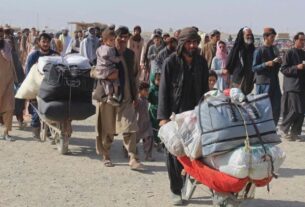A meningitis outbreak in northwest Nigeria has killed at least 26 people, with dozens more infected. Health officials have raised concerns about the rapid spread of the disease and the urgent need for medical intervention.
“We are facing a serious health crisis,” a Nigerian health official said, warning that more cases could emerge. Many infected individuals are in critical condition, and hospitals are struggling to keep up.
The outbreak has affected multiple communities in the region. Most of the reported deaths occurred in rural areas where access to healthcare is limited.
Doctors have confirmed that the disease is spreading quickly. Meningitis is a bacterial infection that causes inflammation of the brain and spinal cord, leading to severe complications if untreated.
Patients have reported symptoms such as high fever, headaches, and neck stiffness. In severe cases, the disease can cause seizures, coma, or death.
Health workers are trying to contain the outbreak. Vaccination campaigns are being planned, but medical supplies are in short supply.
“People need immediate treatment,” a hospital worker said, explaining that some patients arrive too late for effective care. Many die within hours of showing symptoms.
Nigeria has faced meningitis outbreaks in the past. The country lies within Africa’s “meningitis belt,” where outbreaks occur frequently due to climate conditions and overcrowding.
Officials say the current outbreak may be linked to weather patterns. Dry and dusty conditions often contribute to the spread of the disease.
Residents are being urged to seek medical help immediately if they experience symptoms. Some communities lack awareness about meningitis, making early detection difficult.
Local governments are working with international health agencies to distribute vaccines. Efforts are also underway to improve sanitation and prevent further infections.
The World Health Organization (WHO) has warned that outbreaks in Nigeria could worsen without urgent intervention. Limited healthcare infrastructure makes it difficult to respond quickly.
Many affected villages lack proper medical facilities. Some patients have to travel for hours to reach the nearest hospital, delaying treatment.
“Some people rely on traditional medicine,” a local leader said, highlighting the challenges of combating the disease. Delayed treatment increases the risk of severe complications.
Health officials are emphasizing the importance of vaccination. Meningitis vaccines have proven effective in reducing outbreaks in other parts of Africa.
Nigeria has launched vaccination campaigns in the past, but coverage remains uneven. Many rural areas do not have access to regular immunization programs.
Medical teams are also distributing antibiotics to those exposed to infected individuals. Quick treatment can prevent the disease from spreading further.
Schools and community centers are being used as temporary health stations. Officials are urging people to cooperate with public health efforts.
Meningitis outbreaks have occurred across West Africa in previous years. The disease remains a major health threat, especially in regions with poor healthcare access.
Efforts to improve early detection are ongoing. Public health officials are training local healthcare workers to recognize symptoms and provide rapid treatment.
The government has declared the outbreak a public health emergency. Additional funding is being allocated to control the situation.
Some experts say climate change may be increasing the risk of infectious diseases. Rising temperatures and shifting weather patterns can create conditions that allow bacteria to spread more easily.
For now, health workers are racing against time. The focus is on treating patients, vaccinating communities, and preventing further loss of life.
Officials are urging international support. Without sufficient medical supplies, the outbreak could spread beyond the current affected areas.
The coming weeks will be critical. If efforts to contain the outbreak are not successful, more lives could be lost.




